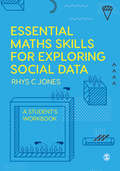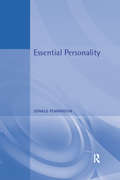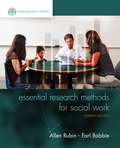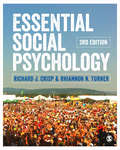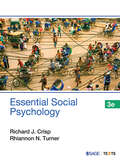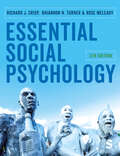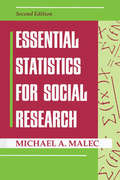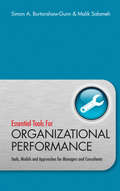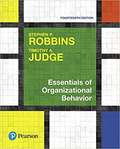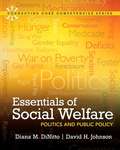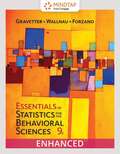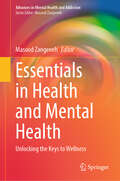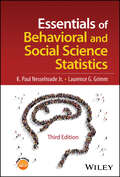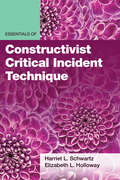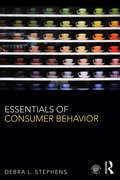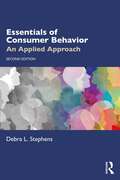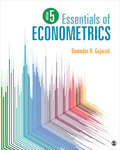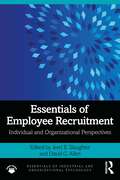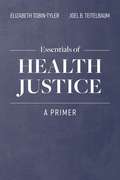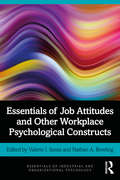- Table View
- List View
Essential Maths Skills for Exploring Social Data: A Student′s Workbook
by Rhys Christopher JonesAre you feeling anxious about statistics? This hands-on workbook is packed with clear explanations, real-world examples and practical exercises to give you the maths skills you need to tackle statistics with confidence. Grounded in a social science context, it features: · Clear introductions to symbols and tasks · Multiple choice questions and exercises · Real world case studies and datasets · A glossary of terms To help you practice, this book is accompanied by useful online resources, including datasets and questions, as well as a selection of author videos.
Essential Maths Skills for Exploring Social Data: A Student′s Workbook
by Rhys Christopher JonesAre you feeling anxious about statistics? This hands-on workbook is packed with clear explanations, real-world examples and practical exercises to give you the maths skills you need to tackle statistics with confidence. Grounded in a social science context, it features: · Clear introductions to symbols and tasks · Multiple choice questions and exercises · Real world case studies and datasets · A glossary of terms To help you practice, this book is accompanied by useful online resources, including datasets and questions, as well as a selection of author videos.
Essential Personality (Essential Psychology)
by Donald Pennington'Essential Personality' provides a clear, accessible and systematic introduction to the major theoretical approaches for the understanding of human personality. This introductory book assumes no prior knowledge of this core area in psychology and is written for students studying personality for the first time, whether at `A' level, first year undergraduates on psychology degree programmes or students on other courses (for example, nursing, social work or criminology).Each chapter considers one or more of the major approaches to personality. For each approach, a brief biographical outline of the originating theorist is given. This is followed by clear and straightforward descriptions of the major aspects of each theory together with clear definitions of key concepts, and concludes with an evaluation section that addresses the 'model' of humans underlying the approach, research evidence in support of the theory and questioning the theory. Discussion is also given to personality assessment and therapeutic applications of the theory or approach.The individual chapters provide figures, diagrams and tables to give a clear understanding of theory and research. and at the end of each chapter, a summary and suggestions for further reading is provided. A glossary at the end of the book provides definitions and explanations of key items, concepts etc.
Essential Research Methods for Social Work
by Allen Rubin Earl BabbieReader friendly and clear, Rubin and Babbie's concise and social work-specific research methods book provides readers with the tools they need to understand the subject matter. Illustrations and examples throughout show readers how they can apply research to practice. Outlines, introductions, boxed features, chapter endings with main points, and review questions and exercises provide the information and practice readers need to learn the essentials. As part of the Cengage Empowerment Series, ESSENTIAL RESEARCH METHODS FOR SOCIAL WORK, 4th Edition, thoroughly integrates the core competencies and recommended practice behaviors outlined in the current Educational Policy and Accreditation Standards (EPAS) set by the Council on Social Work Education (CSWE).
Essential Social Psychology
by Richard J. Crisp Professor Rhiannon TurnerFrom aggression to altruism, prejudice to persuasion, Essential Social Psychology 3e introduces students to the discoveries and debates that define social psychology today. It covers both classic and cutting edge research studies and provides plenty of real life examples and illustrations to help students to develop a good understanding of the subject whilst building the confidence to apply this knowledge successfully in assignments and exams. An extensive range of learning aids including a glossary, summary sections and memory maps – combined with an array of features on the student section of the companion website – will help reinforce this learning and check retention at specific milestones throughout the course. New to the third edition: A new full-colour design Two brand new chapters on Applied Social Psychology and Social Psychological Methods Coverage of some developing research perspectives including social neuroscience and evolutionary psychology New ‘Back to the Real World’ textboxes which situate academic findings in the context of the world around you An enhanced SAGE edge™ companion website (study.sagepub.com/crispandturner3e) with a suite of features to enhance your learning experience.
Essential Social Psychology
by Richard J. Crisp Rhiannon N. TurnerThis second edition of an introductory text for undergraduates contains two new chapters, new debates at the end of each chapter, and more contemporary research and examples. The text is written in an accessible, conversational style with a sense of humor and features short chapters in a simple but reader-friendly two-color layout. Coverage encompasses classic and contemporary studies, with chapters on topics such as social cognition, group processes, prosocial behavior, affiliation and attraction, and friendship and love. Learning features include chapter-ending memory maps (graphic concept organizers), boxed readings, within-chapter summary boxes, and large color headings and subheadings. Each chapter also provides individual and group thought exercises and discussion topics, plus annotated lists of further reading. A companion web site contains quizzes, flashcards, and blank memory maps. Instructors can access lecture slides, a test bank, and animated memory maps online. Crisp teaches psychology at the University of Kent. Turner teaches social psychology at the University of Leeds. Annotation ©2012 Book News, Inc. , Portland, OR (booknews. com)
Essential Social Psychology
by Richard J. Crisp Rhiannon N. TurnerHelps readers build a strong groundwork through easy and accessible discussion on essential theories and research in social psychology. The third edition to this well-acclaimed textbook offers a lively introduction to the major theoretical debates, new approaches, and findings in the discipline. The concise yet well-rounded chapters cover the classic and contemporary studies incorporating a range of approaches - from evolution to neuroscience, from critical to qualitative perspectives. By thoroughly integrating latest research from the field, Essential Social Psychology encourages readers to develop critical insights to the topics and identify their application to real-world issues. Feature Highlights Dedicated chapters on Applied Social Psychology and Social Psychological Methods Coverage of developing research perspectives on social neuroscience and evolutionary psychology 'Back to the Real World' textboxes to situate academic findings in the context of the real world Extensive range of learning aids - cases and examples, summary sections, memory maps, assignments, and so on.
Essential Social Psychology
by Richard J. Crisp Rhiannon Turner Rose MeleadyEssential Social Psychology introduces you to the core topics in Social Psychology, covering its history, methods, and approaches, as well as helping you grasp key topics such as social influence, group processes, prejudice, friendship, affiliation, and love. This new edition has a strong emphasis on real-world applications, for example exploring how social psychology was applied during the Covid-19 pandemic. It has been updated to include more in-depth coverage of contemporary topics such as social media, the digital world, as well as social justice topics, such as LGBTQ+ issues in psychology. This book is ideal for undergraduate students of social psychology. Richard Crisp is Professor of Social Psychology at Durham University. Rhiannon Turner is Professor of Social Psychology at Queen’s University Belfast. Rose Meleady is an Associate Professor in Psychology at the University of East Anglia.
Essential Social Psychology
by Richard J. Crisp Rhiannon Turner Rose MeleadyEssential Social Psychology introduces you to the core topics in Social Psychology, covering its history, methods, and approaches, as well as helping you grasp key topics such as social influence, group processes, prejudice, friendship, affiliation, and love. This new edition has a strong emphasis on real-world applications, for example exploring how social psychology was applied during the Covid-19 pandemic. It has been updated to include more in-depth coverage of contemporary topics such as social media, the digital world, as well as social justice topics, such as LGBTQ+ issues in psychology. This book is ideal for undergraduate students of social psychology. Richard Crisp is Professor of Social Psychology at Durham University. Rhiannon Turner is Professor of Social Psychology at Queen’s University Belfast. Rose Meleady is an Associate Professor in Psychology at the University of East Anglia.
Essential Statistics For Social Research: Second Edition
by Michael MalecWe need only scan a newspaper or magazine, turn on a news broadcast, or open a sociology text or journal to see that we live in an age that is heavily dependent on statistical information. The extent this dependency is such that it is rather difficult to be an educated person without having at least a passing acquaintance with basic statistics. More to the point, it is virtually impossible to be a capable social scientist without having a definite, if elementary, understanding of some basic statistics and statistical methods of analysis. But a casual acquaintance with a few simple statistics will not serve the social scientist who attempts to read competently the literature of the field. And if one wishes to do quantitative social research—and most research published today is quantitative—a more thorough knowledge of statistics is imperative. The aspiring sociologist need only examine the books and articles that are being published today for evidence of this claim. A very large portion of the articles published in the major sociology journals use some form of statistical analysis. Some of these articles and other works published sociologists are incomprehensible without a statistics background; others will simply be read less intelligently or with a lessened sense of appreciation or criticism.
Essential Tools for Organisational Performance
by Malik Salameh Simon Burtonshaw-GunnThis book focuses on organizational development for increased business performance. The text and models cover process management, leading to change management and organizational development. Burtonshaw-Gunn and Salameh show that process implementation in any business depends on two key factors. First, the role of knowledge management in organizational and individual improvement is vital. Secondly, performance management for individual employees, and collaboration between organizations can bring about lasting change and development. Each chapter presents a balance between the organization's and individual performance commitment, and features helpful pointers to further sources of information.Using the authors' knowledge and practical experience across a range of organizations and cultural settings this publication depicts the systematic efforts required for organizational development. This covers the following five major elements, each with a dedicated chapter describing in detail the tools and techniques necessary for successful performance improvement:Process ManagementChange Management and Organizational DevelopmentPeople-Focused Performance ManagementKnowledge Management and PerformanceOrganizational Performance through Tactical and Strategic PartneringEssential Tools for Organizational Performance not only brings these inter-related topics together in a logical way but allows each to be considered as a stand-alone performance strategy. It fully references the original source of the models used and where additional in-depth information may be found.Find out more on the Essential Tools website: www.essentialtoolsseries.com"This is an extremely useful book for both business students and practicing managers. It presents models and theoretical frameworks, derived from research, in a way that is stimulating, accessible and of practical value. Topics are logically sequenced for ease of reference and the material is interesting and clearly presented without being oversimplified. Burtonshaw-Gunn and Salameh have produced a clear and practical guide that will help to improve management practice."Sue Gill, Organisational Psychologist, Director of In-Company Programmes, Salford Business School, University of Salford, Greater Manchester
Essentials Of Organizational Behavior
by Stephen Robbins Timothy JudgeEssentials of Organizational Behavior teaches readers how to communicate and interact within organizations, through real-world scenarios. The text offers comprehensive coverage of key organizational behavior (OB) concepts, making each lesson engaging and easy to absorb. Readers can use the book’s concepts to apply what they’ve learned to their own education, future career plans, and other organizational endeavors. <p><p> Currently used at more than 500 colleges and universities worldwide, Essentials of Organizational Behavior serves as a popular resource so readers can learn and understand the most important concepts in OB. With updated research and the integration of contemporary global issues, the 14th Edition focuses on the most relevant OB concepts that resonate with readers.
Essentials Of Social Welfare: Politics And Public Policy
by David Johnson Diana DiNittoEssentials of Social Welfare: Politics and Public Policy (a briefer version of Social Welfare: Politics and Public Policy, 7/e) introduces the major social welfare policies and programs in the United States and encourages readers to think about conflicts in social welfare today. It emphasizes the current political aspects of policymaking and major social welfare programs. <p><p> In this book, social welfare policy is portrayed as the ever-evolving result of public conflict over social problems, the resources Americans choose to allocate to those problems, the debate over whether these problems can best be solved through government, and the political choices involved in reaching even tentative consensus.
Essentials Of Sociology 11th Edition
by James M. HenslinA Down-to-Earth Approach James Henslin shares the excitement of sociology in Essentials of Sociology: A Down-to-Earth Approach, 11/e. With his acclaimed "down-to-earth" approach and personal writing style, the author highlights the sociology of everyday life and its relevance to students' lives. With wit, personal reflection, and illuminating examples, Henslin stimulates students'' sociological imagination so they can better perceive how the pieces of society fit together. In addition to this trademark down-to-earth approach, other distinctive features include: comparative perspectives, the globalization of capitalism, and visual presentations of sociology. MySocLab is an integral part of the Henslin learning program. Engaging activities and assessments provide a teaching a learning system that helps students see the world through a sociological lens. With MySocLab, students can develop critical thinking skills through writing, explore real-world data through the new Social Explorer, and watch the latest entries in the Core Concept Video Series. Revel from Pearson is a new learning experience designed for the way today''s students read, think, and learn. Revel redesigns familiar and respected course content and enriches it for today''s students with new dynamic, rich-media interactives and assessments. The result is improved student engagement and improved learning. Revel for Henslin will be available for Fall 2014 classes. This program will provide a better teaching and learning experience-for you and your students. It: Personalizes Learning with MySocLab: MySocLab is an online homework, tutorial, and assessment program. It helps students prepare for class and instructor gauge individual and class performance. Explores a A Down-to-Earth Approach: This title highlights the sociology of everyday life and its relevance to students' lives. Improves Critical Thinking: Features throughout help build critical thinking skills. Understands Social Change: An important theme of the text, social change over time, examines what society was previously like, how it has changed, and what the implications are for the present and future. ALERT: Before you purchase, check with your instructor or review your course syllabus to ensure that you select the correct ISBN. Several versions of Pearson's MyLab & Mastering products exist for each title, including customized versions for individual schools, and registrations are not transferable. In addition, you may need a CourseID, provided by your instructor, to register for and use Pearson's MyLab & Mastering products. Packages Access codes for Pearson's MyLab & Mastering products may not be included when purchasing or renting from companies other than Pearson; check with the seller before completing your purchase. Used or rental books If you rent or purchase a used book with an access code, the access code may have been redeemed previously and you may have to purchase a new access code. Access codes Access codes that are purchased from sellers other than Pearson carry a higher risk of being either the wrong ISBN or a previously redeemed code. Check with the seller prior to purchase.
Essentials Of Statistics For The Behavioral Sciences
by Frederick Gravetter Larry Wallnau Lori-Ann ForzanoA brief version of Gravetter and Wallnau's proven bestseller, ESSENTIALS OF STATISTICS FOR THE BEHAVIORAL SCIENCES, 9th Edition delivers straightforward instruction, unrivaled accuracy, built-in learning aids, and a wealth of real-world examples and illustrations. The authors take time to explain statistical procedures so that students can go beyond memorizing formulas and begin gaining a conceptual understanding of statistics. By skillfully integrating applications that reinforce concepts, they ensure that even students with a weak background in mathematics can fully understand statistics. <p><p> The text also leads readers to become savvy consumers of information by showing how having an understanding of statistical procedures will help them comprehend published findings. This edition features a new focus on learning objectives, which provide a structure for organizing lectures and preparing assignments and exams.
Essentials in Health and Mental Health: Unlocking the Keys to Wellness (Advances in Mental Health and Addiction)
by Masood ZangenehIn a world increasingly characterized by rapid change and constant challenges, maintaining good physical and mental health is more important than ever. "Essentials in Health & Mental Health" is a comprehensive exploration of the multifaceted landscape of health and well-being, delving into key aspects that affect individuals of all ages, backgrounds, and circumstances. Through the lens of 20 meticulously crafted chapters, this book takes you on a journey to understand the essential elements that contribute to our overall health, from the invisible struggles of loneliness and mental health problems to the impact of global events like the COVID-19 pandemic. The book begins with an eye-opening chapter that sheds light on the pervasive nature of loneliness and its profound impact on the functioning of individuals. The authors delve into the various costs of loneliness and uncover the under-recognized association between loneliness and mental health problems. In a world interconnected like never before, these insights are essential for anyone seeking to understand the complexities of human well-being.
Essentials of Behavioral and Social Science Statistics
by Laurence G. Grimm K. Paul Nesselroade Jr.Comprehensive resource on applying statistical analyses to behavioral and social science research situations, with new examples, methods, and support for computing in Excel and SPSS The Third Edition of Essentials of Behavioral and Social Science Statistics prompts the student to develop a deep understanding of the psychometric principles involved in the research process, as well as a mastery of the particular functionality of the most common statistical tools and an ability to properly select and use them in the real world; this goal is achieved thanks to the organization of the text, the philosophical content interspersed within it, the depth of the exercises and work problems, and the supporting materials provided for the instructor and student. The Third Edition has been thoroughly edited and streamlined to allow for students to move efficiently through the conceptual and mathematical fundamentals and on to the payoff formulas and descriptions of applications. New content includes philosophical issues associated with psychometrics and inferential statistical testing, interpretation, measurement, and the replication crisis in the social sciences. End-of-chapter exercises and work problems have been strengthened and reorganized to further improve comprehension and performance. Section reviews that draw on concepts from all preceding chapters are included to help students develop skills of statistical tool selection and application. Support for instructors includes chapter-based learning objectives, test banks, and PowerPoints. Essentials of Behavioral and Social Science Statistics includes information on: Basic concepts in research covering the scientific method, types of variables, controlling extraneous variables, validity issues, and causality and correlationDescriptive statistics including scales of measurement, measures of central tendency and variability, transformations, and standardized scoresThe fundamentals of inferential statistics, including probability theory, sampling distributions, the central limit theorem, and the terminology of hypothesis testingThe logic and application of basic inferential tests including single-sample tests, independent-and dependent-samples t tests, and the basics of power analysisThe logic and application of three common ANOVA analyses; one-way, two-way, and repeated-measuresThe logic and application of basic bivariate data analysis tools, linear correlation and linear regressionThe logic and application of chi-square analyses, both goodness-of-fit and tests-for-independence Written to facilitate concept mastery and enable practical application of concepts, Essentials of Behavioral and Social Science Statistics offers a survey of basic descriptive and inferential statistical tools and concepts and is highly suitable to support a rigorous undergraduate behavioral science or social science statistics course.
Essentials of Constructivist Critical Incident Technique (Essentials of Qualitative Methods Series)
by Harriet L Schwartz Elizabeth L. HollowayThis book is a step-by-step guide to designing and realizing a constructivist critical incident (Constructivist CIT) study. This qualitative methodology explores critical moments in people's lived experiences. The authors offer the first comprehensive overview of Constructivist CIT, a structured, yet flexible methodology used to explore lived experience and improve practice and process by studying critical or meaningful moments and experiences. The authors introduce Constructivist CIT in relation to its well-established parent method Critical Incident Technique, which has been used widely in the social sciences, health care, and business. Readers will learn how to ensure the trustworthiness of their study&’s design, collect and analyze the data, and write up and submit their study for publication. An intuitive method, Constructivist CIT is an accessible method for novice researchers as well as seasoned scholars expanding their qualitative repertoire.
Essentials of Consumer Behavior
by Debra L. Stephens<p>Essentials of Consumer Behavior offers an alternative to traditional textbooks for graduate students. Shorter than competing books, but no less rigorous, it includes unique material on vulnerable consumers and ethics. <p>Balancing a strong academic foundation with a practical approach, Stephens emphasizes that consumer behavior does not simply equate to buyer behavior. She examines the thoughts, feelings, and behaviors that shape consumers’ attitudes and motivations in relation to brands, products, and marketing messages. Providing a concise guide to the discipline, the author covers key themes such as vulnerable consumers, new technologies, and collaborative consumption. <p>The book is supported by a rich companion website offering links to videos and podcasts, surveys, quizzes, further readings, and more. It will be a valuable text for any graduate student of consumer behavior or marketing, as well as any interested consumers.
Essentials of Consumer Behavior: An Applied Approach
by Debra L. StephensThis thoroughly updated second edition of Essentials of Consumer Behavior offers a concise alternative to traditional textbooks with a practice-based approach. Stephens emphasizes that consumer behavior does not simply equate to buyer behavior. She examines the thoughts, feelings, and behaviors that shape consumers’ attitudes and motivations in relation to brands, products, and marketing messages. The new edition of this concise guide to the discipline offers comprehensive coverage of issues including: Technology now integrated into all chapters Consumer vulnerability, expanded beyond young consumers and persons with disabilities to include the economically disadvantaged and those marginalized because of ethnicity and gender Consumers’ roles in the lives of nonhuman animals, with extensive discussion of the consumer journey toward acquiring an animal companion and the impact of pet ownership on consumers’ non-pet-related purchases Suitable for marketing and consumer behavior students at advanced undergraduate and postgraduate levels, this clearly written and thorough textbook will keep students engaged and help them to become savvier marketers. Online resources include links to videos and podcasts, further reading, questions, and exercises. Instructor supplements include PowerPoint slides and chapter quizzes.
Essentials of Econometrics
by Damodar N. GujaratiThis updated Fifth Edition of Damodar N. Gujarati′s classic text provides a user-friendly overview of the basics of econometric theory from ordinal logistic regression to time series. Acclaimed for its accessibility, brevity, and logical organization, the book helps beginning students understand econometric techniques through extensive examples (many new to this edition), careful explanations, and a wide array of chapter-ending questions and problems. Major developments in the field are covered in an intuitive and informative way without resorting to matrix algebra, calculus, or statistics beyond the introductory level. A companion website for the book includes resources for both instructors and students. Further details are on the Resources tab above.
Essentials of Econometrics
by Damodar N. GujaratiThis updated Fifth Edition of Damodar N. Gujarati′s classic text provides a user-friendly overview of the basics of econometric theory from ordinal logistic regression to time series. Acclaimed for its accessibility, brevity, and logical organization, the book helps beginning students understand econometric techniques through extensive examples (many new to this edition), careful explanations, and a wide array of chapter-ending questions and problems. Major developments in the field are covered in an intuitive and informative way without resorting to matrix algebra, calculus, or statistics beyond the introductory level. A companion website for the book includes resources for both instructors and students. Further details are on the Resources tab above.
Essentials of Employee Recruitment: Individual and Organizational Perspectives (Essentials of Industrial and Organizational Psychology)
by David G. Allen Jerel E. SlaughterThis book provides an insightful and comprehensive summary of the field of employee recruitment. Written from a scientific evidence-based perspective, and with contributions from global experts, it reviews the relevant research in the various areas of recruitment, considers the most pressing current issues in studying recruitment topics, and designs future research agendas for the field.Organized into four sections, the text begins by presenting an overview of the study of recruitment, before moving on to demonstrate effective ways of attracting talent, covering methodology, practices, and organizational characteristics. The third section focuses on recruiting specific populations, including women, ethnic and racial minorities, college students, and employed job seekers. This book concludes by providing practical perspectives, with chapters describing how the applicant population is changing, how applicants interact with people and technology during recruitment, the interaction of applicant and organizational political ideology, and offering insights on how to design recruitment programs today and in the future.A foundational resource on employee recruitment, this is the ideal text for scholars and graduate students in industrial and organizational psychology and human resource management. It will also interest practitioners working in the area, along with executive and line managers tasked with responsibility for talent management.
Essentials of Health Justice: A Primer
by Joel B. Teitelbaum Elizabeth Tobin-TylerThis book examines the social and structural determinants of health, systems of care for underserved populations, health equity, social justice and health policy. Unlike other texts of its kind, this book uniquely focuses on the legal, structural, and justice issues underlying health disparities; the adequacy of current safety net programs and legal protections affecting the health of vulnerable populations; health policy, law and system design focused on achieving health equity; and concrete strategies for bringing about change to promote health justice. This book can serve as a stand-alone text or supplement for a range of undergraduate, graduate, law, public health, medical, nursing and other health professions courses.
Essentials of Job Attitudes and Other Workplace Psychological Constructs
by Valerie I. SessaAlthough the topic of job attitudes and other workplace psychological constructs such as perceptions, identity, bonds, and motivational states is important, there are no books addressing the topic as a whole. Essentials of Job Attitudes and Other Workplace Psychological Constructs seeks to fill that void in a comprehensive edited volume that compiles chapters by experts on each construct. Essentials of Job Attitudes and Other Workplace Psychological Constructs begins with a review of the concept of job attitudes and other workplace psychological constructs, then devotes a single chapter to each construct. These chapters focus on organizational justice, perceived organizational support, organizational identification, job involvement, workplace commitments, job embeddedness, job satisfaction, employee engagement, and team-related work attitudes. Each of these chapters addresses parallel content including definitions, history, theory, a critique of the field to date with future research recommendations, and how the given construct can be used in practice. There are two additional features that make this book unique: first, each chapter provides a nomological network figure of the workplace psychological construct addressed; and second, each chapter provides one or more of the current measures used to assess the construct of interest. Essentials of Job Attitudes and Other Workplace Psychological Constructs is an ideal text for students and professionals in industrial-organizational psychology, organizational behavior, and human resource management.
